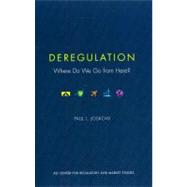As the ongoing financial crisis fuels anti-market sentiment in Washington, the deregulation, industry restructuring, and regulatory reform initiatives of the last thirty years are increasingly coming under attack. In this timely monograph, Paul L. Joskow argues that the crisis in the financial market should not become an excuse for reversing beneficial regulatory reforms in other sectors. The financial crisis presents a valuable opportunity to evaluate a broad range of regulatory reform options and make reasoned decisions about their rightful application to financial products and markets.
Competitive markets, while not perfect, are typically the most effective institutions for allocating scarce resources efficiently. Deregulation, privatization, and regulatory reform initiatives have generally (though not always) benefited the U.S. economy by lowering costs, enhancing rates of innovation, matching consumer preferences and product quality, and creating more efficient price structures. In some cases, market imperfections necessitate the introduction of regulatory mechanisms to improve performance. But before imposing new regulations on a particular market, policymakers must apply a disciplined framework for identifying whether, where, and how regulatory policies can improve market performance, taking into account the benefits of regulatory constraints and the costs of regulatory and market imperfections. Reforms to financial products and markets in particular must be based on a complete understanding of the causes of the current crisis, a comprehensive review of the associated market imperfections, a clear articulation of regulatory goals, and a careful assessment of the strengths and weaknesses of alternative regulatory mechanisms.
"If history is any guide," Joskow warns, "the rush to implement reforms in response to the immediate crisis without fully understanding its causes and developing comprehensive measures to address the market failures is likely to lead to at least some 'quick and dirty' regulato








